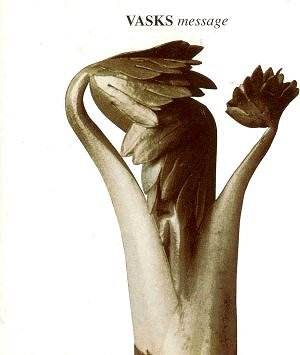.This disc comes from the first
Latvian recording session John Kehoe
arranged with Vasks. Kehoe had been
captivated by three one hour programmes
co-ordinated by Kriss Rusmanis on BBC Radio
3 in 1992. The crop of Conifer recordings
was the result.
Vasks is rarely forbidding.
However this collection stresses his
accessible style. The Cantabile
for strings rises, as so often with
Vasks, from nothing and cloaks the skyscape
with high cycling strings buzzing in
blessèd polyphony. The ecstatic
release sought by Vasks is comparable
with that of Tippett in the Double Concerto.
It is stripped of all density and obfuscation
- a cooling Barber adagio. Given that
the icily avant-garde First String Quartet
was written in 1975 it is a surprise
that only four years later he was writing
music of such eloquent directness of
expression.
The Cor Anglais Concerto
came about as a result of a commission
from Thomas Stacy, cor anglais of the
NYPO. It is in four movements of which
two are Elegies. The first elegy glances
towards Sibelius's Swan of Tuonela.
It has a bleached regretful tone as
also does the second elegy (tr.4). The
finale has aleatoric elements. It is
noble and the composer fixes things
so that an oriental tone rises clear.
The cor anglais is most touchingly played
by Normunds Schnee.
Message is dark-hued
initially and unusually tense. Once
again whispered violin glissandi play
their part. The string orchestra smoothness
is contrasted with quiet flittering
and flickering playing from the two
pianos and punctuation from a varied
percussion battery. The quiet string
writing is like an extrapolation of
the whispering violin lines in Sibelius's
Luonnotar. This builds into a
strangely exultant peroration.
Musica dolorosa
is for strings and solo cello. It
is a sustained lament. It was dedicated
to Vasks' sister who died shortly before
the piece was written. Its dolorous
aspect is also down to the bleak politics
of the time. Vasks who describes himself
as a sad optimist usually offsets quiet
tragedy with consolatory voices. Not
so here. The intensity of the threnody
takes us very close to Pettersson in
the last few moments of this 12½ minute
piece.
Lauda dates
from 1985 and is a song of praise to
the Latvian nation. It was written in
the year of the 150th anniversary of
Krisjanis Baarons who had collected
thousands of Latvian folksongs. The
piece plays for just over twenty minutes.
It is in seven sections some of which
are aleatory. After an introduction
which is rather akin to a refrigerated
Barber adagio comes an optimism-soaked
hymnal which rises to some extremely
forthright writing for ragingly triumphant
brass. This again rises to a paean of
activity and praise with much percussion
and with searching writing for violins.
As the victory dissipates birdsong can
be heard like that in Sibelius's Nightride
and Sunrise alongside quiet pattering
percussion as in Hovhaness's Moss
Garden.
Rob Barnett
